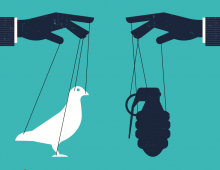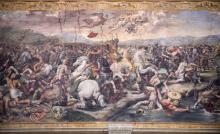peace and justice

Peace studies combine research, analysis, and practice in an attempt to answer questions of what peace actually requires, why accepted wisdom has failed to move civilization away from violence and toward peace, and how people have successfully reformed social, economic, and political relationships to achieve sustainable peace. And through this study, real-world answers are emerging.

Christ-followers are given another angle of vision, another mirror into our souls, in the person of Jesus Christ. No passage of Scripture points more acutely to this image than one of this week’s lectionary texts: Philippians 2:1-13. The Apostle Paul invokes the Christ hymn as a means of reminding us who we are called to be. He urges his readers to “be of the same mind” and to “have the same love” as the one who’s image they bear. Put simply, Jesus-followers are called to participate in a selfless, humbling, even self-emptying mode of being in the world.
How then ought Christ-followers respond to the religiously-inspired violence perpetrated by groups like ISIS/ISIL? I believe that Christ-followers, while denouncing all forms of violence—especially religious violence—ought to respond with compassion and sympathy.
We are able to move toward compassion and sympathy when we are able to articulate religious violence according to broader historical, geopolitical, and theological modes of analysis. What we require is something beyond bland appeals to ethical imperatives or capitulation to the rhetoric and presuppositions of religious extremists. We need a way to traverse the gulf that separates demonization from compassion, hatred from love.
My thinking about religious violence is sharpened by the work of my friend and mentor Ted A. Smith. In his forthcoming book, Weird John Brown: Divine Violence and the Limits of Ethics (Stanford University Press), Smith articulates a moral vision fueled by practical reason beyond that which is captured within an “immanent frame of causes and effects.” Smith writes explicitly to the concept of divine violence, which is a type of violence that claims some kind of immediate relation to that which is counted as holy, sacred, or ultimate. In light of Smith’s astute analyses, and following the model established by Christ Jesus, we may call Christians to a particular kind of understanding in the face of religious violence.
[Editors' note: Below is a hymn written by Carolyn Winfrey Gillette to inspire churches to further support and pray for famine relief in Somalia.]
O God, You Love the Needy
7.6.7.6 D LLANGLOFFAN ("Rejoice, Rejoice, Believers")O God, you love the needy and care for all the poor!
Today our hearts are heavy with news of drought and war.
When plantings yield no harvest, when hungry people die,
When families flee, defenseless -- Lord, hear your people's cry!
Many people remember "O God, Our Words Cannot Express," a hymn written on the afternoon of September 11, 2001. The hymn was quickly shared by email and Web postings (it is still on over 10,000 websites); it was used by many churches on that evening and in the days that followed. The hymn was featured in newspaper stories, radio programs, twice on national PBS-TV, and on BBC-TV in the United Kingdom. YouTube has the Church World Service music video by Emmy winner Pete Staman of this hymn being sung by Noel Paul Stookey (of "Peter, Paul & Mary") with the Northfield Mount Herman School Choir.
The new posting of this interfaith hymn includes a revised version for the 10th anniversary. Also included is "God, We've Known Such Grief and Anger", a hymn lifting up Christian hope in the face of disaster that was written for the first year anniversary of 9/11. Last week I wrote a new hymn for the tenth anniversary of September 11 with an emphasis on working for peace and justice for all.
[Editors' note: Below is a hymn written by Carolyn Winfrey Gillette lamenting gun violence. We hope you find it helpful in light of the shootings in Arizona.]
As our nation mourns the untimely death of the King of Pop, I am grieving over the death of a lesser know man: a man whom many will never know, but whose mark on the world is significant. Two weeks ago, Rev.
JIM CORBETT started bringing Central American refugees into his home in 1981, after discovering that U.S. immigration officials regularly detained and deported them. Corbett shared his experiences with John Fife, and in 1982 the "underground railroad" became the public sanctuary movement. A Quaker and a Harvard-educated philosopher, Corbett was forced into early retirement from ranching by severe arthritis. —The Editors
Sojourners: What are your feelings about the trial?
Jim Corbett: The trial is thoroughly rigged. I don't think they could find another judge in the Ninth Circuit who would be as firmly against us and determined to gain a conviction at any cost as is Judge Earl Carroll. But even if we do get convicted this time, juries down the line will find out the truth.
The strategy that the government has had to rely on involves keeping the jury from discovering what is going on. The government has had to abandon all those tape recordings that were made and use as its star witness a person who is reporting on conversations in English that he admitted he couldn't understand very well. The government has done all that because it could not afford to let the jury discover what is happening. And I think that a strategy based on suppressing the truth is a flawed strategy.
What we're in the process of doing now is establishing a new tier of legal order, one that was mandated at the Nuremberg trials [of Nazi officials] but which has never been systematically established on any kind of institutional foundation. The institution in this case is the church, and the mandate is that communities and individuals are responsible for the defense of human rights, above all when their own government is violating human rights. Justice Robert H. Jackson, the chief U.S. prosecutor when the Nuremberg tribunals opened in 1945, emphasized that it's essential to hold ordinary citizens responsible for compliance with human rights and international law when their own government is in violation of those rights. As he pointed out, the only way states have of enforcing international law against one another, when you come right down to it, is through warfare. So if we're going to have a peacemaking expansion of the legal order to include an international legal order, we're going to have to rely on ordinary citizens in communities to do that.